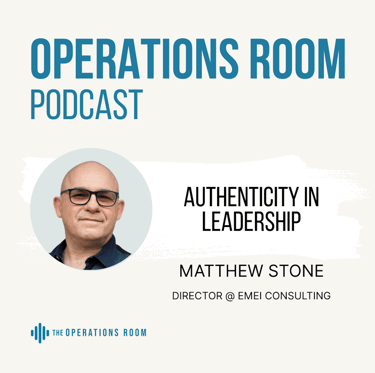What Separates Good Executives from Great Ones?
In the latest episode of The Operations Room podcast, hosts Brandon Mencinga and Bethany Ayers explore the critical difference between competent and exceptional C-suite leadership with executive coach Matthew Stone from EMEI Consulting. The conversation reveals that true leadership excellence stems from authenticity, emotional intelligence, and genuine curiosity about both yourself and others.
The Foundation of Great Leadership: Self-Awareness and Curiosity
Brandon: What is the difference between good executives and great executives at the C-suite level in your eyes?
Matthew: Great executives are able to create truly engaged empathic relationships where they recognize what's outstanding about the people that are around them and are willing to engage from that place. They also choose to be a cultural barometer - they recognize organizational values and choose to role model them, inviting the best from the people around them.
Bethany: Which immediately brings me to another question - greatness in whose eyes?
Matthew: I think greatness is appraised as a result of the outcome. What happens for the folks that are there? What happens to the markets that they are serving? So I think greatness is what greatness does, rather than what it actually means for the individual.
The Accountability Challenge
Brandon: Something that occurs to me is this struggle in scale-ups for the CEO where you want to have that empowered culture, you want that autonomous culture, but also a really accountable culture. How can a CEO best foster that accountability side of things?
Matthew: Often the real challenge COOs face is the ability to navigate conversations where accountability is front and center and doing it in a way that's constructive, empathic, but nonetheless leaning into the direct responsibility. That is one of the most significant skills - how do you steward high performance and be willing to lean into the emotionality without being driven by the emotion.
Bethany: Maybe COOs are so tied to OKRs and measurable outcomes that they don't have to have the tough conversations. Telling somebody they haven't hit a KPI is not the same thing as holding somebody to account.
Matthew: What I'd be really curious about is what would feel like a really aligned way to appraise whether someone is performing in a way the organization requires. I think creating that alignment is complicated, and I think what we're actually talking about is alignment first, then accountability.
Building Executive Presence Through Authenticity
Brandon: The CEO always wants to be in a position where they have really good executive presence. Can you talk us through what a CEO might think about to help themselves on that pathway?
Matthew: What I notice about presence is that it's normally an outcome of authenticity. When someone recognizes the truth of how they think and feel in any situation and chooses to inhabit that in a way that feels congruent - that sense of clarity is what sums up to integrity presence. It's not jazz hands, it's not loudness, it's a function of self-understanding.
Bethany: With a woman's view on this, one of the things I've been told in my career and a lot of other women are told quite often is that we lack gravitas. Do you have anything specific you would advise women to do?
Matthew: My experience is that gravitas is a function of clarity. If women are being told their executive presence is not landing, then be even more clear - not louder, not more assertive, but even clearer. I would encourage deepening into the truth of who they are rather than trying to ape the male approach, because the truth of who they are is more than powerful enough.
The Power of Curiosity and Emotional Intelligence
Brandon: How do leaders become more self-aware and better at the EQ side of things?
Matthew: Choosing to be curious about ourselves. If we're going to be emotionally competent, the first person we need to be emotionally competent about is us. That curiosity could look like: Why do I feel this way in this conversation? What is my true sense of purpose at work? What happens when I feel stressed? When we have that self-understanding, it gives us the ability to create understanding with our colleagues.
Brandon: I appreciate the fact that EQ is a learned skill because sometimes it's a bit of a cop-out for people where it's like, I'm just not good at it, it's not who I am.
Matthew: I think the reality is that having a conversation to explore somebody's relationship with the task is deprioritized and not seen as efficient use of time. My counsel is that it is - strengthening teams comes as a function of emotional understanding and aligned commitment around task.
Final Wisdom
Brandon: If you could leave our audience with one thing from the conversation today, what would that be?
Matthew: The greatest investment you can make in your ability to be truly impactful in your work is be curious. Be curious about yourself at depth and be curious about your colleagues, and when answers come, listen up. That's probably the greatest skill a leader can generate.




